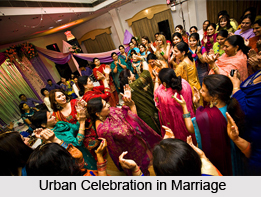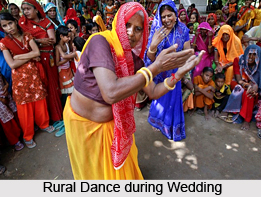 Themes of folk songs on marriage cover a wide range of emotions and events. These range from the wedding jitters and anticipation of the bride, the various ceremonial songs and songs on the life after marriage. Some of the most common themes which find constant refrain in almost parts of the country are the issues of separation, the various ceremonies held during marriage and the life post-marriage.
Themes of folk songs on marriage cover a wide range of emotions and events. These range from the wedding jitters and anticipation of the bride, the various ceremonial songs and songs on the life after marriage. Some of the most common themes which find constant refrain in almost parts of the country are the issues of separation, the various ceremonies held during marriage and the life post-marriage.
Songs on separation
To a young girl, marriage is both a matter of anticipation and apprehension. Marriage means the uprooting of a girl from the soil and family in which she has grown into womanhood. The time of departure for the bride is one of sorrow and dejection. The climax of all marriages is separation from old ties and this is the burden of these songs. The songs are sung by women in sorrowful tones. A great many songs voice the protest of the girl against her arranged marriage, as is the system prevalent in rural Indian society. All these complaints are made against the father as she knows hoe helpless her mother is, especially in a joint family. The girl in her new home must work; there is no sympathy, no affection. Things become so unbearable for her that at times she desires death, the warm embrace of the flaming pyre. In the midst of miseries, she has only one solace, the thought of her mother`s affection. But the mother is a distant star. This is how the folk songs reflect the social conditions and the woman`s place in society.
However, it may be mentioned here that in tribal or such other social groups, where woman enjoys a certain measure of freedom, such problems seldom arise. Under normal conditions, she marries the man of her choice. There is no social taboo. This is particularly true in the north east where the youth enjoy great freedom in matters of love and marriage.
Ceremonial Songs
Indian marriages, particularly Hindu marriages, are an elaborate process. As such, they have inspired a considerable number of folksongs. Most of these songs are of a documentary character and seldom have any symbolic significance. In Assamese Hindu society, for instance, both the bride and the groom are given ceremonial bath at their respective places. This ritual of bath is attended by a series of songs of haunting melody. Some of the social groups use an earthen pot called kalsa or dulari as a part of their marriage ritual. The pot is filled with rice to the brim and on it is placed an earthen lamp that is lighted. This is a custom distinctive of the Baiga, Gond, Pardhan and the Assamese.
 It has its own songs. During the ceremony, often there are competitive songs between two groups of women, representing the bride`s and groom`s party respectively. These are mostly taunting and mocking songs In Assamese, these songs are called Joranavi and constitute the lighter side of the ceremony. In other States like the Punjab and Uttar Pradesh, similar songs of filthy abuse are sung, more particularly by women, which lend colour to the occasion. These songs are inevitably symbolic in significance. Thus a whole process of social rite is gone through. There are number of such ceremonial songs sung in different regions of the country. There is nothing of religion in it. It simply adds colour and life to the ceremony.
It has its own songs. During the ceremony, often there are competitive songs between two groups of women, representing the bride`s and groom`s party respectively. These are mostly taunting and mocking songs In Assamese, these songs are called Joranavi and constitute the lighter side of the ceremony. In other States like the Punjab and Uttar Pradesh, similar songs of filthy abuse are sung, more particularly by women, which lend colour to the occasion. These songs are inevitably symbolic in significance. Thus a whole process of social rite is gone through. There are number of such ceremonial songs sung in different regions of the country. There is nothing of religion in it. It simply adds colour and life to the ceremony.
Songs on Married Life
Songs on married life are many in number. There are a number of emotions a woman has to go through after marriage. Marriage for the woman entails a complete change in her lifestyle as even her place of residence is no longer the same. There is a major upheaval in her life as she is far from her family, has to adjust to a new life and attend to her husband`s needs. All these feelings of change and anxiety at performing new duties find expression in the folk songs on marriage. Her trouble with her taunting in laws, new set of responsibilities and the pain of separation from her own family are common themes of the songs on life after marriage.
Marriage means children. The child-bearing capacity of the woman is a thing that is admired most in society. A woman, incapable of it, is socially looked down upon. The woman is conscious of it. She knows how unfortunate it is to be a barren woman. The frustration and fears of a woman looking to have children also find expression the various songs. The complaint against polygamy also finds expression in these songs as it is quite rampant in the agrarian society. The reason for such marriages is purely economic- more people means more working hands and more children who will prove helpful in the future. Often, this does not remain a silent complaint. The girl is sick of the atmosphere of her polygamous home. The only way out is to run away.
The problems of incompatible marriages are also sung in songs. This is natural. Often, husbands are minors, because of early marriages prevailing in our society. Often, they are too old and physically not competent. Thus girl`s complaint against her father for arranging an incompatible marriage or her misery at being married to a man far removed from the man of her dreams is often a theme of folk songs on married life.




















